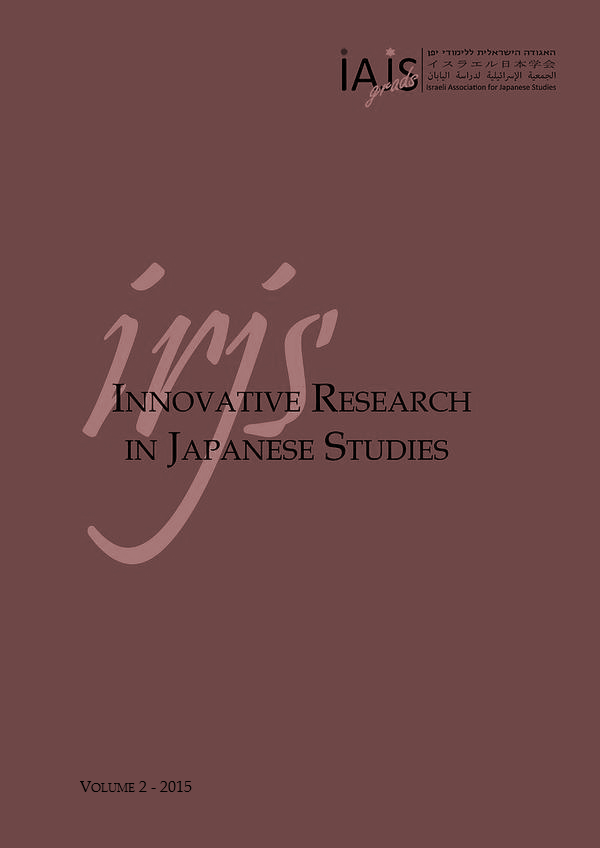Volume 2, Fall 2015
Outgoing Editor: Michal Daliot-Bul
Dear readers of Innovative Research in Japanese Studies,
It is my pleasure to present you with the second volume of our journal.
This unique project would not have been possible without the support of our external reviewers and of our managing staff, in particular our language editor Nikki Littman and the managing editor of this volume, Rotem Ayalon.
This volume offers two interesting articles by graduate students that, in our opinion, show particular promise. The first by Patrick Hein presents a critical analysis of Prime Minister Abe Shinzo's narrative on "healthy nationalism." The second by Yulia (Jules) Shein-Kushnir, examines the way in which keitai culture has impacted notions and practices of couplehood. More>>
TABLE OF CONTENTS
Japan as Montage
Eiji Otsuka
pages 3-27
This lecture was delivered during an IAJS-Grads workshop on May 11, 2015, at The Hebrew University of Jerusalem. The workshop was a pre-conference event of The Third Biannual Conference of The Israeli Association for Japanese Studies. The lecture was translated from Japanese by Dr. Mika Levy-Yamamori (Tel Aviv University) and Dr. Michal (Miki) Daliot-Bul (The University of Haifa).
Lost Pride and Wounded Honor:
The Contradictions of Shinzo Abe’s Healthy Nationalism
Patrick Hein
pages 28-63
ABSTRACT
Japan has been struggling to reclaim a secure and stable national identity since its defeat in World War II. Polls have shown that while a majority of citizens believe that patriotism should be fostered, only half actually feel love for their country, and thus the desire of some Japanese for openly expressed patriotism has been unfulfilled. In a book first published in 2006 and then updated in 2013, which sold over half a million copies, the current prime minister of Japan, Abe Shinzo, laid out his bold agenda for a solution to this problem and a more self-confident Japan. He has been particularly eager to strengthen what he terms "healthy nationalism" and to advocate for greater assertiveness in Japan’s external relations. Western media has been at odds over how to qualify the Abe brand: is he a neoconservative reformer or right-wing militarist nostalgic? The article presents and discusses the key themes of Abe’s roadmap and argues that the contradictory nature of his ideological claims, which claim to be at the same time ethnic and civic, conservative and liberal, exclusionary and universalist, must be understood within the context of the globalization challenge facing Japan: how to simultaneously safeguard a strong national identity and be a respected international partner?
KEYWORDS: Healthy nationalism, Pride, Globalization, Revised history, Dilemma
Influence of the Use of Keitai Media on Couple Relations in Japan
Yulia (Jules) Shein-Kushnir
pages 64-86
ABSTRACT
Over the last two decades researchers have noted the possible negative consequences of increased reliance on digital technology in the field of social relations. They have warned of the “bad quality” of the new conversations, of new kinds of solitude, loneliness, social exclusion and of the possibility of losing traditional human relationships. But as anxieties about the negative effects of technology mount, so does evidence of its potential benefits. In the spirit of McLuhan’s “The Medium is the Message,” and considering the lack of sharing and communication between Japanese couples in the past, in this paper I examine the changes in the relationships of Japanese couples as a result of the addition of keitai email in the specific context of Japanese society. I argue that the asynchronous and discreet keitai email (in contrast to the nature of phone calls) has allowed for the existence of unlimited, continuous and diverse mail communication between partners which has increased the feeling of closeness between the partners and strengthened their relationship. In addition, the specific characteristics of this email correspondence has helped Japanese couples to overcome the difficulty in expressing their feelings verbally and has enabled a greater communication of feelings between them and thus improved their relationships and made it more open and honest. Finally, the discreet nature of emails has also reduced the involvement of parents in the lives of Japanese young people and thus enabled them to communicate more openly with their partners and enjoy greater ease and independence in their relationships.
KEYWORDS: Keitai, Email messages, Mobile media influence, Couple relations in Japan, Intimate relationships
Submission Deadline, Guidelines and Instructions:
Innovative Research in Japanese Studies new submission guidelines and deadline for our 2016 edition will be announced shortly.
The 2014 & 2015 ubmissions guidelines can be found here. Please refer to our Frequently Asked Questions for more information.
© 2014 by IAJS Grads
